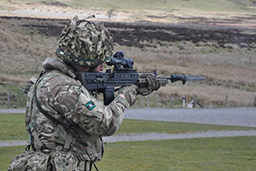Do the British need a Citizen Army?

The head of the British Army, General Sir Patrick Sanders, has advocated for the establishment of a "citizen army" in preparation for potential future land wars. In a speech at an armoured vehicle conference, he expressed concerns that merely increasing reserve forces would not be sufficient in addressing the evolving threat landscape. General Sanders highlighted the specific danger posed by Russia and drew attention to the measures taken by other European nations to ready their populations for potential conflicts.
Notably, he did not advocate for conscription but proposed laying the groundwork for a voluntary call-up in the event of war. Emphasizing the importance of a "whole-of-nation undertaking," he urged the UK's "pre-war generation" to prepare for the possibility of war, citing the need for a proactive approach.
This isn't the first time General Sanders has warned about the growing threat of war and the inadequacy of Britain's preparedness. He previously expressed concerns about Russia's actions in Ukraine, framing it as an attempt to undermine the established system and way of life.
In terms of military readiness, General Sanders called for a reversal of recent cuts to the Army's size, advocating for a force capable of rapid expansion. He proposed a target of 120,000 personnel within the next three years, incorporating both regular and reserve forces. However, he stressed that workforce alone would not create the necessary capability and called for simultaneous efforts to modernize and equip the armed forces.
Referencing the experiences of countries like Sweden and Finland, which are taking steps to ready their nations for potential conflicts with Russia, General Sanders urged the UK not to overlook the lessons of history. He cautioned against repeating the mistakes of 1914 when the nation failed to perceive the escalations that led to World War I.
While acknowledging challenges in recruitment, General Sanders highlighted a 28% reduction in the Army's size over the last 12 years. Despite this, he noted that applications to join the Army were at their highest level in six years. The general's stance aligns with his consistent criticism of cuts to troop numbers and military spending, a sentiment shared by other military figures, including former Chief of the General Staff General Lord Dannatt. The warnings from military leaders have sparked concerns among politicians, with some expressing skepticism about the government's appreciation of the gravity of the situation, particularly regarding the threat posed by Russia.
A few Pro's and Con's of a Citizen Army
A citizen army, composed of individuals who are not career soldiers but rather civilians who can be called upon in times of need, has both advantages and disadvantages. Here are some of the key pros and cons:
Pros:
Broad Representation: A citizen army can be reflective of a broad cross-section of society, bringing in individuals with diverse skills, backgrounds, and perspectives.
Cost-Effective: Maintaining a citizen army can be more cost-effective than a standing professional army. The military only bears the full cost when the force is activated.
National Unity: The concept of a citizen army can foster a sense of national unity and shared responsibility. It reinforces the idea that national defense is the duty of all citizens.
Rapid Expansion: In times of emergency or war, a citizen army can be quickly expanded by mobilizing reservists, providing a rapid response to a changing security environment.
Skills Diversity: Citizens often bring a wide range of skills and expertise from their civilian lives, which can be valuable in certain situations, especially in roles requiring specialized knowledge.
Cons:
Training Time: Citizens may lack the training and experience of professional soldiers. The time required to train and mobilize a citizen army could be a disadvantage in sudden or unexpected conflicts.
Inconsistent Skill Levels: The skills and abilities of citizen soldiers may vary widely, leading to inconsistencies in the proficiency of the force.
Limited Availability: In peacetime, citizen soldiers have civilian commitments (jobs, education, family), which can limit their availability for military service. This might impact the readiness of the force.
Lack of Specialization: A citizen army may lack the specialization and expertise found in a professional military, particularly in high-tech or complex operations.
Logistical Challenges: Mobilizing and coordinating a large number of citizen soldiers can present logistical challenges, especially in terms of equipment, infrastructure, and communication.
Potential for Resistance: Some citizens may be resistant to mandatory military service, leading to morale and discipline issues within the force.
Vulnerability to Political Influence: A citizen army may be more susceptible to political influences, as the individuals comprising it are closely tied to the civilian population and may have strong opinions about the political climate.
In summary, the effectiveness of a citizen army depends on various factors, including the nature of the threat, the available resources, and the level of commitment and cooperation among citizens. Each approach to national defense has its own set of advantages and challenges, and the choice between a citizen army and a professional military often reflects a country's specific security needs and












